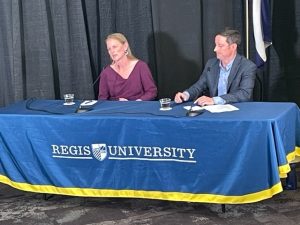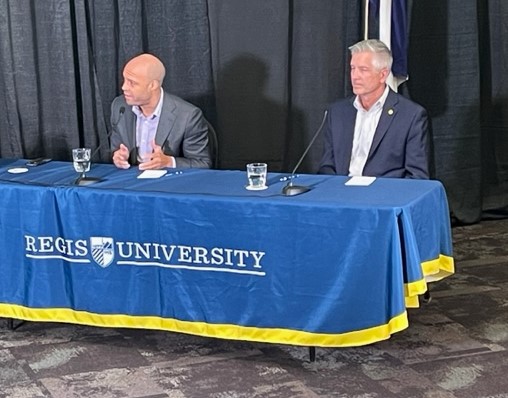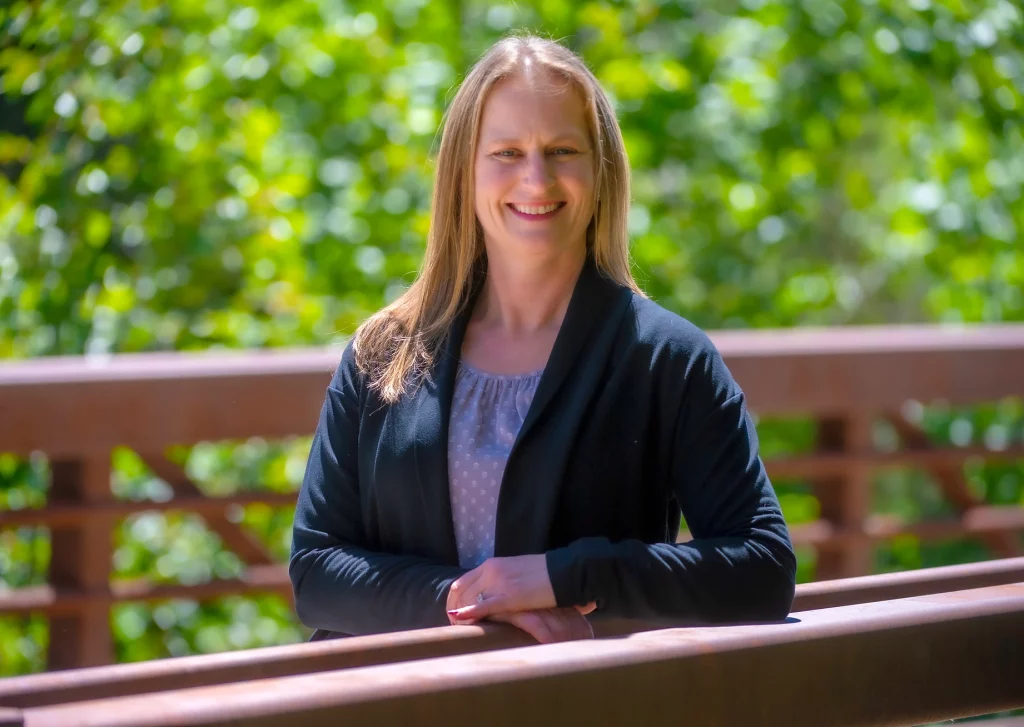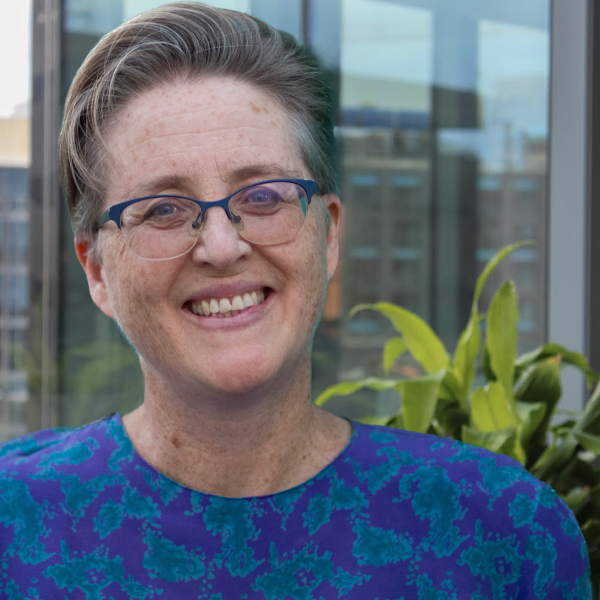With less than a week before ballots go to voters, sharp differences emerged Wednesday night in the competition for three Denver school board seats as challengers offered more specifics beyond the need for new leadership.
The forum at Regis University at times turned into an animated debate despite strict time and rebuttal rules set by organizers.
Ballots go out Oct. 16 for the Nov. 7 election.
Kwame Spearman and John Youngquist squared off over dueling endorsements in what has effectively become a two-person race for the citywide at-large board seat.
Spearman, running as the son of a Denver educator but also as an “outsider” who brings business and large organization leadership experience, is backed by the Denver Classroom Teachers Association.
Youngquist, a longtime Denver educator and former East High School principal, is backed by Denver Families Action, a reform advocacy group organized in part by local charter school networks.
“Denver Families Action is committed to privatization of schools,” Spearman argued. “We’ve got to support our neighborhood schools. I’m not anti-charter, but it’s time to have honest conversations about where our school funding is going.”
Youngquist countered by saying Denver Families Action has not asked him to do anything in endorsing him as the most qualified candidate.
“I have spent 35 years in neighborhood schools, in district-run schools, and I am devoted to make certain they are strong for every child” he said. “I’m also devoted to strengthening the innovation status of charter schools to make certain that every single child no matter the kind of school that their parent chooses has an excellent experience.” He noted that 30,000 DPS students attend charters
Youngquist and Spearman each have raised about $70,000 in campaign contributions, according to the most recent Secretary of State report. Brittni Johnson, the other active at-large candidate, did not attend the forum and has raised only $976. Earlier candidates Paul Ballenger and Ulcca Hansen, dropped out of the race.
On school safety, Spearman said the board should not have removed Denver police officers – Student Resource Officers – from high schools three years ago without a plan to ensure students are safe. Looking forward, however, he said SROs should be replaced by community security officers. He also called for an overhaul of discipline policies that includes a return to alternative schools for students with chronic discipline problems.
“I’ve got to be honest, I don’t even know what a ‘discipline matrix’ means,” he said. “We need to simplify what we call our discipline matrix, and it needs to essentially have three components: We need baseline guidelines for safety in our schools, we have a plan to (replace) SROs with community officers, and we need to have a learning environment for students who are causing disciplinary problems or dealing with external things that affect them in the classroom.”
Youngquist supported the board’s decision to bring back SROs after the East High School shooting but said they should not be involved in student discipline. He criticized the board for not developing its discipline matrix without input from principals and educators “who are doing the work on a day-to-day basis” to balance the need to ensure school safety with the need to serve students with discipline problems.
“Right now, we need to …think not about redeveloping elements of the matrix but to scrap it, to recreate it in a way that makes sense for our students and our community,” he said.
Both agreed that the board should not have extended Superintendent Alex Marrero’s contract and given him a pay raise early in his tenure without directing an in-depth evaluation of his performance.
“It’s been difficult to watch,” Youngquist said.
Added Spearman: “We need a compelling vision … We are in a crisis of confidence.”
Different visions for District 1 in Southeast Denver
Incumbent Scott Baldermann faced off with Kimberlee Sia, an education consultant, former CEO of KIPP Colorado charter school network, former president of Colorado “I Have a Dream” Foundation and former teacher.
The two were cordial to each other but fundamentally disagree on key issues such as board performance, budget policies, and oversight of the district’s innovation schools.

“I would not describe the board as dysfunctional,” Baldermann said in response to a question about board infighting and negative publicity. While he disagrees with certain actions by other members, he said he has worked on “implementing our values into our policies” such as governance and long-term planning.
Baldermann, who has been endorsed by DCTA for a second term, favors changing student-based budget policies that allocate more money for schools with high-need students, many of them smaller schools, to a model that provides essential services to all schools in a more equalized way.
“We are in a declining enrollment environment … about 45 percent of our schools are considered small. The inefficiencies of these small schools far outweigh the weight that is provided in student-based budgeting.”
Sia, endorsed by Denver Families for Action, disagreed.
“I support student-based budgeting because I think that’s how we get the dollars directly to the students and what their needs are. By having a (budget allocation) that follows students no matter what school they are at and then also having extra money based on the needs they have helps the school figure out how they are going to spend their budget based on the students at their school.”
Baldermann said he supports innovation and charter schools but wants them more accountable to the elected board and not allowed to waive collective-bargaining rights of teachers.
“In my first term, nine charter schools closed,” he said. “Each one of those schools served high populations of vulnerable students. I think it’s too risky for us to continue down the path where we have alternate governance models that function more as businesses and can close like businesses.”
As a parent and educator, Sia said DPS needs to support all schools and focus on student success rather than the misplaced priorities of the current board.
““My own children have attended traditional schools and charter schools…” Sia said. “I believe we need to provide support to all our schools and also to apply the same level of of accountability. We need to work with teachers, families and students to figure out how we can collaborate and learn from each other.”
Two challengers in District 5 in Northwest Denver
Incumbent Charmaine Lindsay, a family law attorney appointed in June 2022 to fill a board vacancy, is challenged by Marlene De La Rosa, retired court specialist and activist in Latino education civic organizations, and Adam Slutzker, a real estate agent and former teacher with three children in DPS.
Lindsay, endorsed by the DCTA, acknowledged the board’s reputation has suffered mainly because of “lack of collegiality” but said she works “behind the scenes” to listen to teachers and families in District 5 and address their needs. In terms of achievement in her heavily Latino district, she said test scores “are deceiving” because scores often show poor results for Latino students, who under state law must take the tests in English rather than Spanish.

“I’ve been in and out of schools, I see what goes on, and talk to people and know what DPS needs to do because I’m there,” she said.
Her priorities going forward are to try to reduce class sizes, strengthen neighborhood schools and help the district recruit and retain teachers of color.
De La Rosa, endorsed by Denver Family Action, said Northwest Denver needs a more activist board member who is focused on better student outcomes instead of tolerating the dysfunction that plagues the current board.
“I want change,” De La Rosa said. “I have spent the last 30 years working in my community, especially my Latino community, and I want to focus on student outcomes making sure our kids feel safe and be safe in order to learn and retaining those high-quality teachers, especially teachers that reflect the students in DPS.”
Slutzker said he entered the race because the district sought to close Columbian Elementary, where his children attend. He said school decisions require a more equitable approach that supports growth and improvement rather than targeting small schools with declining enrollment or low test scores. He also supports more resources for neighborhood schools because “the school choice system is broken” serving too many affluent families.
De La Rosa took issue with him, saying nearly half the families in DPS opt for school choice for their students of color. “We need to support all of our schools,” she said.
The Regis forum was sponsored by CBS Colorado, Chalkbeat Colorado, Educate Denver and other civic organizations. You can watch the entire two-hour forum streamed Thursday night at 7 p.m. on CBS News Colorado website, which includes Spanish language captioning.




